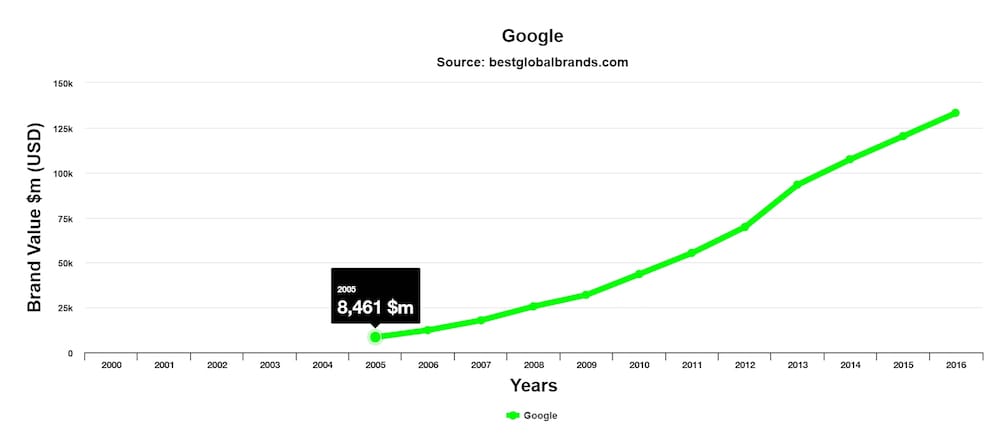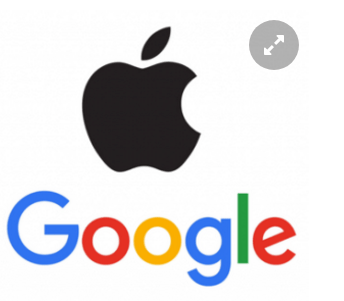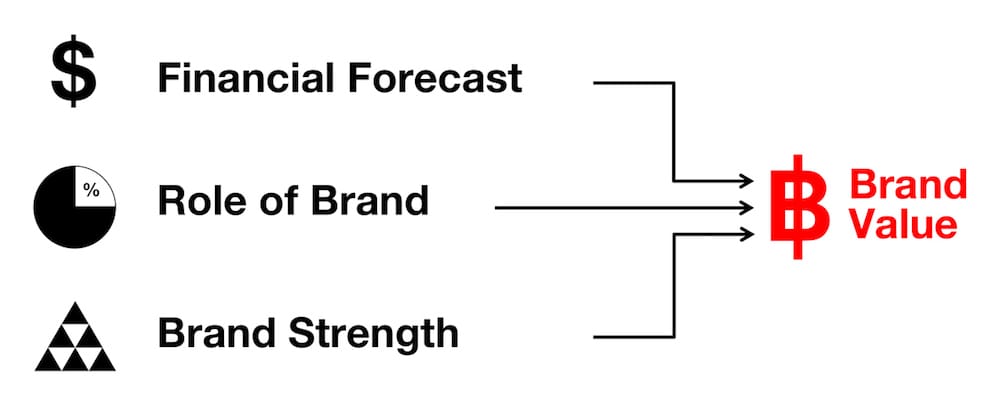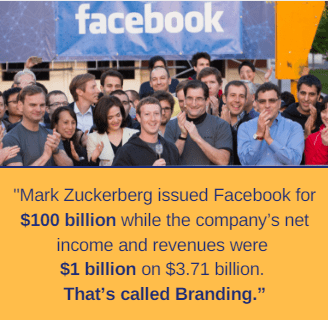Which is a stronger brand? How do I know? Where was the Facebook brand ranked? And why any entrepreneur should care?

Apple vs. Google
Which is a stronger brand? How do I know? Where was the Facebook brand ranked? And why any entrepreneur should care?
I stand between two worlds. My 1st world (for 21 years) was global brands, international marketing, marketers’ strength, Customer is king, etc.…
– And my current world (for the last 10 years) of entrepreneurs, startups, innovation, venture capitals, exits and failures. Most of them failures.
Unfortunately, most startups and entrepreneurial businesses fail. However, in my experience, entrepreneurs have much more influence on their chances of success than they think.
In this post I would try to show how entrepreneurs can dramatically affect their success rate.
The top / biggest 100 brands list
In my old world, every year we waited for the day of the Best 100 brands ranking publication. Brands’ evaluation has existed for more than 30 years. The first brand ranking list I found is from 1996:

For 17 years, Coca Cola was the number 1 brand in the world. In 2005, Google was ranked for the first time; jumping directly to the respectable 38th place...

According to Interbrand, in 2011, both Apple and Google were in the Top 10. And then, in 2013, Coca Cola lost the crown as 1st biggest brand and Apple took 1st place.
Interbrand is not alone; there are more 100 top ranking brands lists, like BrandZ – the Top 100 Most Valuable Brands List from Kantar Millward Brown that was launched in 2006 And more. Though, I think that from its first day the BrandZ list was more.
The winners of 2017 ranking was Apple (According to Interbrand) they have been in 1st place since 2013 with Google in 2nd place.

According to the BrandZ Ranking list, Google has led the list for the last two years. Apple took the lead in 2011-2013 and then again in 2015.
How come the indexes are different for these two rank lists? Probably because the companies are using different methods to measure the value and strength of the brands, and these measurements are subjective.

The power of a brand and how it’s measured
There are three key components to all of our valuations: an analysis of the financial performance of the branded products or services, of the role the brand plays in purchase decisions, and of the brand’s competitive strength.

This is the important issue about brands.
Brand perception makes money. A lot!!
Let’s start with the question: what is a brand?
In order to understand what a brand is, I like to start with talking about what a business is for.
What is the real purpose of any business? Without a doubt, the purpose of any business is to maximize its value for its shares holders. I believe all business people can agree on that.
This value is built on two factors the financial results and the brand perception in consumers’ mind.
Measuring the first factor is easy and equal in every evaluation.
Regarding the second factor, I like to remind my audience that Mark Zuckerberg issued Facebook for a value of $100 Billion when the annual net income of the company was only $1 Billion's

The reason for this huge gap is the value of the brand perception built on the brand reputation in the minds of the customers or consumers.
As I said, brand perception makes a lot of money.
Now let’s talk about the definition of brand, or branding: “The process of creating an identity and differentiation for your company or product in the minds of customers or consumers”.
According to Interbrand, the brands are ranked by three major parameters; The financial forecast, The role of each Brand and the strength of the Brand”.
Interbrand valuation methodology
The brand perception in the mind of the customer is one of the most influential parameters of the company’s financial value!!
And where is Facebook in the ranking?
“Facebook enters the top 10 global brands for the first time”

Facebook entered Interbrand’s top 10 Global Brands in 2017, and has climbed the ranks to become the world’s eighth most valuable brand, breaking into the top 10 for the first time.
Brand = A lot of money for the company.
Entrepreneurs should focus on building their brands from the 1st day of their launch and should start planning it much earlier.
Remember these movie, Steve Jobs? The one with Michael Fassbender and Kate Winslet? The opening scene is the launching of the 1st Macintosh. Jobs is driving everyone crazy at the last minute before the launch starts because the demo doesn’t start with the Macintosh say “Hello”. Jobs understood the strength of people’s perception. This should be the most critical issue for any entrepreneur. It doesn’t matter if you just opened a digital marketing company of your own or invented the 1st wireless smartphone charging surface. It doesn’t matter if you are the first. It matters if you are the first in the mind of the consumers!
There is where the real battle is being handled, not in labs.
Not every entrepreneur can be Jobs or Zuckerberg. I always say that if that were the case nobody would need marketers. For me, Jobs and Zuckerberg both in the same unique shelf of golden cups, the geniuses shelf, because they both had this same gene of genius that enables them to listen or see some people’s speak or behavior and automatically run and write it (or ask their developer to write it) into a code.
For those of us that don’t have this gene along with all the other unique character traits that turned Jobs and Zuckerberg to who they are– luckily we have branding...
So, why should entrepreneurs care so much about branding? Because, as I wrote before, a leading brand means a lot of money. But I think that part is well known to any entrepreneur. What they don’t know is how you build a brand and more importantly, that if you follow the rules; it’s quite simple and totally doable. It’s not something that either happens to you or not due to some mysterious reaction of customers to your entrepreneurial product or service.
What I mean by that is that it’s true that building a brand is a doctrine or a science that has clear rules to follow. The first rule is building the brand is only possible if there is a true need (either apparent or hidden) among a specific group of the audience. The second rule is what matters in branding is how well you understand your audience and what you manage to “plant” in the minds of the consumers.
How do you build a brand that will increase your entrepreneurial success rate dramatically?
So, how do you do that? How do you build a leading brand for entrepreneurial business? I can’t cover all of that in this specific post (however, I’ve wrote a lot on this subject and we will be very happy to send you our entrepreneurial mini guide: How entrepreneurs build a strong leading brand from the first day?
Building a brand:
- Start with understanding exactly and deeply what the product, service, or idea is from the entrepreneurs’ point of view
- Search wide and deep, and map the market overview, as well as people’s behavior in regards to the product/ service/ idea
- Interview potential (or existing) target audience members to look for a match
- Choose the brand’s fundamentals according to where the biggest market opportunity is for your business. The fundamentals:
- Target audience (the potential customers)
- Product definition (from the view point of the selected target audience)
- Which market category has the best chance to lead?! (That’s how you win the market)
- What is your value proposition – meaning what is the main factor that will drive customers to purchase. (That is what will affect your messages, look and feel, etc.)
- Building your brand’s visual identity and basic brand and marketing materials: The short must have list of Brand Materials:
- Logo
- Website
- Video
- Pitch
- Create your brand plan focusing on exposure, presence, and awareness
- Build your marketing and sales activities plan for 6 months based on your objective and goals.
- Preparation for launch or relaunch
- Measure performance vs. goals, compare, discuss, decide on the changes needed, plan, and implement.
Here we are already talking about marketing and sales, which are, of course, a part of building your brand (Yes, sales are also part of building your brand!) I’ll write about it in another post.
I would be grateful to hear any feedback, questions, stories, requests, or thoughts that you wish to share with me.


